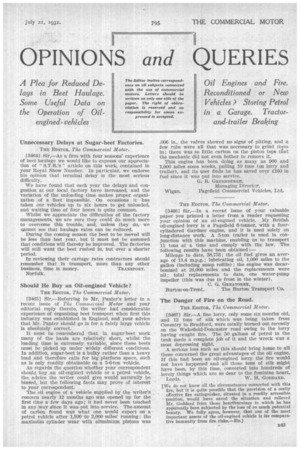OPINIONS • and QUERIES Unnecessary Delays at Sugar-beet Factories.
Page 61

If you've noticed an error in this article please click here to report it so we can fix it.
THE EDITOR, The Commercial Motor.
13464] Sir,—As a firm with four seasons' experience of beet haulage we would like to express our apprecia tion of " '' article on this work, contained in your Royal Show Number. In particular, we endorse his opinion that terminal delay is the most serious difficulty.
We have found that each year the delays and congestion at our local, factory have increased, and the variation of the unloading time makes proper organization of a fleet impossible. On occasions it has taken our vehicles up to six hours to get unloaded, and waiting time of four hours is quite common.
Whilst we appreciate the difficulties of the factory managements, we are sure they could do much more to overcome this trouble, and, unless they do, we cannot see that haulage rates can be reduced.
During the coming season the beet to be moved will be less than last year, but it must not be assumed that conditions will thereby be improved. The factories will still want the beet rushed in, but over a shorter period.
In reviewing their cartage rates contractors should remember that in transport, more than any other business, time is money. TRANSPORT. Norfolk.
Should He Buy an Oil-engined Vehicle ?
THE EDITOR, The Commercial Motor.
[3465] Sir,—Referring to Mr. Panter's letter in a recent issue of The Commercial Motor and your editorial reply thereto, the writer had considerable experience of organizing beet transport when first this industry was established in England, and your advice that Mr. ranter should go in for a fairly large vehicle is absolutely correct.
It must be remembered that in sugar-beet work many of the hauls are relatively short, whilst the loading time is extremely variable, since these beets must be picked up under widely different conditions. In addition, sugar-beet is a bulky rather than a heavy load and therefore calls for big platform space, such as is only readily obtainable on a 5-6-ton vehicle.
As regards the question whether your correspondent should buy an oil-engined vehicle or a petrol vehicle, the advice the writer could give would naturally be biased, but the following facts may prove ct interest to your correspondent.
The oil engine of a vehicle supplied by the writer's concern nearly 12 months ago was opened up for the first time a:few days ago; it had never been touched in any way since it was put into service. The amount of carbon found was what one would expect on a petrol vehicle after 1,500 to 2,000 miles' running; the maximum cylinder wear with aluminium pistons was .006 in., the valves showed no signs of pitting, and a few rubs were all that was necessary to grind them in; there was so little carbon on the piston tops tilat the mechanic did not even bother to remove it.
This engine has been doing as many as 900 and 1,000 miles some weeks, pulling 10 tons (on lorry and trailer), and its user finds he has saved over £160 in fuel since it was put into service.
G. R. GREENRERGR, Managing Director, Wigan. Pagefield Commercial Vehicles, Ltd.
THE EDITOR, The Commercial Motor.
[34661 Sir,—In a recent issue of your valuable paper you printed a letter from a reader requesting your opinion of an oil-engined vehicle. My British oil-engined lorry is a Pagefield 6-tonner, with a fourcylindered Gardner engine, and it is used solely on long-distance work. A 5-ton trailer is used in conjunction with this machine, enabling us to transport 11 tons at a time and comply with the law. The following results have been obtained:— Mileage to date, 38,753; the oil fuel gives an average of 11.4 m.p.g.; lubricating oil, 1,000 miles to the gallon (including sump refills) ; the engine was decarbonized at 26,000 miles and the replacements were nil; total replacements to date, one water-pump impeller (this was due to frost in the winter). C. G. GREATOREX,
Burton-on-Trent. The Burton Transport Co.
The Danger of Fire on the Road.
THE EDITOR, The Commercial Motor.
[3467] Sir,—A fine lorry, only some six months old, and 12 tons of silk which was being taken from Coventry to Bradford, were totally burned out recently on the Wakefield-Doncaster road owing to the lorry having caught fire. The 50 gallons of petrol in the tank made a complete job of it and the wreck was a most depressing sight. A serious loss such as this should bring home to all those concerned the great advantages of the oil engine. If this had been an oil-engined lorry the fire would not have happened and all those tons of silk might have been, by this time, converted into hundreds of lovely things which are so dear to the feminine heart.
Leeds. W. H. GoDDARD.
[We do not know all the circumstances connected with this fire, but it is quite possible that the provision of a really effective fire extinguisher, situated in a readily accessible position, would have saved the situation and relieved Mr. Goddard from those heartburnings to which he has apparently been subjected by the loss of so much potential beauty. We fully agree, however, that one of the most important assets of the oil-engined vehicle is its comparative immunity from fire risks.—En.]




































































































